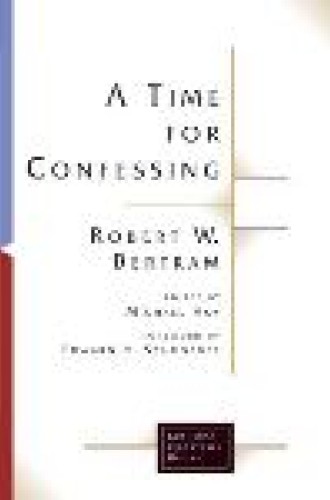A Time for Confessing
Academic circles sometimes include a giant who publishes relatively little despite the pleading of students and colleagues. Such a figure was Robert Bertram, whom longtime colleague Edward Schroeder calls, in his grateful foreword, “the most unpublished Lutheran theologian of the twentieth century.”
Bertram taught theology for 50 years in Lutheran institutions, including Valparaiso University, Concordia Seminary (St. Louis), Christ Seminary–Seminex and the Lutheran School of Theology at Chicago. He published dozens of articles and prepared even more public lectures. However, when he died in 2003, Bertram left only one “book,” a dissertation that engaged Karl Barth’s critique of Luther, and a handful of larger projects with which he never quit tinkering.
Bertram frequently joked that Christians cultivated certain curious habits, such as reading other folks’ mail and acting as if it belonged to them. He was referring not only to Christianity’s appropriation of Judaism’s canon, but also to the early circulation of its own writings. Paul wrote passionately and specifically to the churches of Galatia and Corinth, but soon others, despite their different circumstances, assumed that these letters addressed them, too. Usually that worked out well enough. Sometimes, as 2 Peter 3:15-16 suggests, it did not.
Given Bertram’s delight in poking gently at the right of authors or their defenders to control who does what with their thoughts and arguments, presumably he would not mind that some who repeatedly encouraged him to publish have gained access to his computer, and with this posthumous volume have treated chapters that he never let go of as though all were meant to see them. Bertram’s voice, and the Spirit’s urgings, speak recognizably and clearly in these pages.
At first glance, this looks like two smaller books under one cover. It opens with seven essays on confessing the faith in moments of crisis and oppression. Then comes a lengthy appendix titled “A Theology of the Cross for a Postmodern World.” It matters little which half one reads first, but the 365 theses that make up the pithy appendix have the look of a summa that took shape over a lifetime in the theological trenches, metaphorical and otherwise.
Throughout these theses, one detects the foundational assumptions and methods that derive from Bertram’s intense engagement with Luther and the Lutheran confessional writings. God’s communicating through law and gospel, the crucified Christ as the Word of God, honoring Christ’s death and the comfort of penitent hearts as the signs of genuine gospel—all these permeate and enliven the sequence of theses that address the current theological scene.
Dialogue between Barth and Luther also emerges as crucial. Barth criticized Luther for fixing theology on God’s relationship to humankind, as though God cannot be understood apart from involvement with and even vulnerability to creatures. Alternatively, Barth worked to understand God “in himself,” without regard to flesh-and-blood entanglements. To Barth, therefore, Christ functions as a revelation of God’s eternal election, and his death becomes less a saving event than a sign that humans have always been saved but simply did not know it. This “revelationist half-truth,” Bertram suggests, permeates a goodly share of current theology.
For Bertram as for Luther, God is deeply involved in both judging and romancing the world and humankind. Drawing strongly on Romans and the reconciliation imagery of 2 Corinthians 5:16-21, Bertram probes the gospel of Christ’s entry into the plight and place of those whom God has abandoned to their sins and perversions, paying little mind to the strongholds of the righteous who need no physician, so that the former, when they come to the end of their rope and breathe their last in utter abandonment, find themselves, to the surprise of everyone, in the company of the crucified Word of God. In this company there is hope—and plenty of work to do.
The chapters that precede the appendix describe this work. Before tackling them, however, taste for a moment the difference between the soteriologies of Barth, Luther and Bertram. In Barth’s theology of revelation, God and humankind relate like an author and a reader. For Bertram, God and humanity become lovers. Faith is “getting loved.”
Grace is like kissing. God does not do it alone. Unilaterally? Yes. Even passionately. But not ineffectually, not without the beneficiaries’ receiving it. The kiss is not thrown or blown or forced or slept through. In one measure or another, sooner or later, it is accepted, enjoyed. If not, whatever “kiss” there was becomes instead a judgment upon the recipient.
The work of God’s beloved consists, at least partly, in confessing—that is, in insisting—through word and deed that the one gospel of the crucified Christ suffices for the unity of the church and serves as its sole authority. A time for confessing arises in those specific, embattled occasions when Christians must disobey temporal authority, including the church’s own, in order to bear witness to the gospel’s sufficiency.
Bertram describes such confessors and their times, including the 16th-century reformers, the black churches of the civil rights era, South Africa’s apartheid resisters, Bonhoeffer in Nazi Germany, the Philippine revolution led by Cory Aquino and, briefly, the Lutheran Church—Missouri Synod group that became exiles from the LCMS in the 1970s.
The most telling, truthful feature in all these stories, as Bertram unpacks the theology of each, is these genuine confessors’ understanding that they must finally put themselves in the wrong over against the temporal authorities whom God has put in place, including the churchly ones, for the sake of witnessing to the right—that is, to the sufficiency of the gospel of the One who, for the sake of the whole, bloody mess of humankind, put himself on the wrong side of the law and suffered the consequences. As Bertram understood, confessors never need to claim rightness for themselves. There is rightness enough, and life as well, in being crucified with the One to whom their lives and words bear witness.





